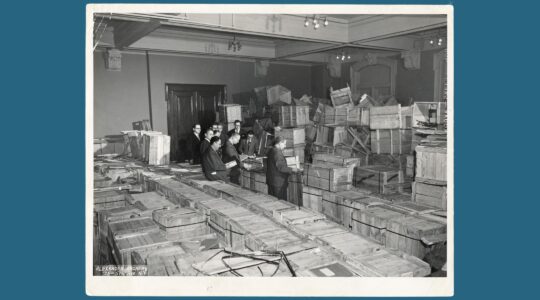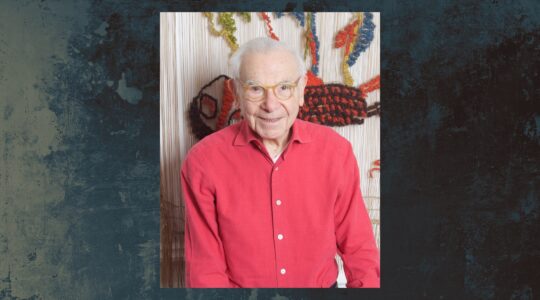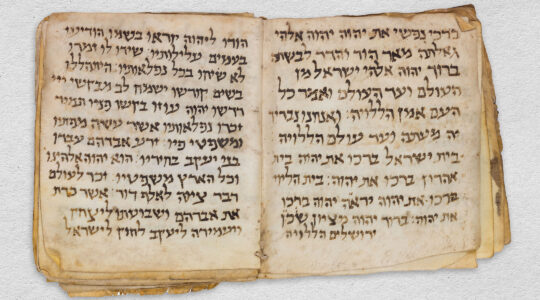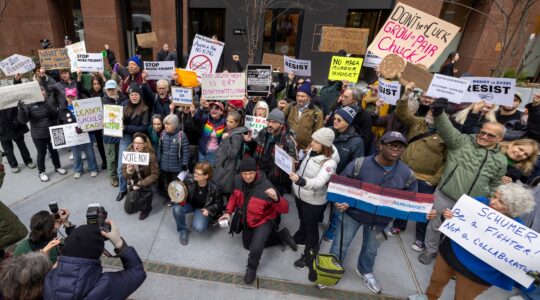It isn’t hard to find a common theme uniting some of the more interesting entries in the final week of the New York Jewish Film Festival this year. From the cafés of Paris to the Catskills, the documentaries on display are ruminations on the role of the Jewish artist in modernity. One could even argue, somewhat tongue-in-cheek, that the excellent Polish thriller “Daas” is about a Jewish artist. A con artist.
“Daas” is an elaborately imagined period piece, set in the Vienna of 1776, involving the strange circle of followers and stalkers surrounding the false messiah Jacob Frank (Oldgierd Lukaszewicz). Written and directed by Adrian Panek, the film is a complicated, cryptic puzzle focusing on two men. Golinski (Andrzej Chyra) is an ex-Frankist who is deeply invested, both financially and emotionally, in his invention of synthetic rubber. Klein (Mariusz Bonaszewski) is an official in the Austrian court who is investigating Frank’s presence in Vienna. Is Frank the miracle worker he purports to be or the greedy fraud Golinski claims? Is he engaged in a vast conspiracy against the Hapsburgs, or is he just another seeker after petty advantages, a typical court hanger-on?
The film begins in a welter of teases, flash-forwards and flashbacks that hint at mysterious cabals and dark debauchery, then it quickly settles into a clever back-and-forth between absurdist events involving the sad-sack Golinski in Poland and a sort of 18th-century Robert Ludlum thriller that Klein’s inquiries quickly become. Through it all, Frank looms as an ominous, mostly unseen presence. Panek resolves the polarities with admirable cleverness and wit and, especially given that “Daas” is his first feature film, the result is immensely satisfying.
Tomer Heymann’s “The Queen Has No Crown” is hardly his first feature. His previous documentaries have included “It Kinda Scares Me” and the widely acclaimed “Paper Dolls,” but “Queen” is his most intensely personal film to date. The film is an extravagantly inclusive look at his own family. He opens with footage of his grandfather, recalling the moment in which he knew he would have to leave an increasingly Nazified Berlin, then rapidly traces the family’s trajectory to Palestine and after. Using a series of Passover seders as the tentpoles that both mark off and support the chronology, Heymann traces the gradual dispersal of his parents and his four brothers, involving divorce and departure from Israel. Like a gay Israeli version of American documentarian Ross McElwee (“Sherman’s March”), Heymann films compulsively, documenting even the most intimate moments. Like McElwee’s family and friends, Heymann’s circle is filled with people telling him to put the camera down and just experience his life firsthand. Happily for those of us who are his audience rather than his subjects, he cannot shake his need to get it all on film and video. “Queen” is an entertaining reminder that all families — happy or sad — are both alike and different.
Erich Mendelsohn was another artist whose need to record images bordered on the obsessive. Mendelsohn, the subject of Duki Dror’s “Incessant Visions: Letters from an Architect,” was one of the great German architects of the Weimar era. He was also an inveterate sketch artist and correspondent, whose 1,200 letters with drawings sent to his wife Louise form the backbone of Dror’s film. Forced to leave Berlin in the early 1930s, the Polish-born Mendelsohn left a trail of innovative buildings in England and Palestine. His work resembles nothing so much as a more austere, geometrical version of the imaginings of Antonio Gaudi, and his very first completed building, a synagogue/community cemetery built in his hometown, suggests that the resemblance might have been even closer had Mendelsohn not fallen in love with concrete as an almost sculptural medium. Dror’s approach to Mendelsohn’s career and work is an ambitious amalgam that brings together the letters and drawings, on-the-street interviews, period footage and contemporary. The film is on its surest footing when it focuses on the buildings, but it is engaging and compelling throughout its modest 70-minute running time.
Joann Sfar, who will be familiar to Jewish Week readers as the creator of “The Rabbi’s Cat” and the director of “Gainsbourg,” is another Jewish artist who is only happy when he has a pen or pencil in his hand. Sam Ball’s clever little film “Joann Sfar Draws From Memory” lets us watch the brilliant comic book artist sitting in cafes sketching the occupants and recording their conversations, working on his books in the studio, and remembering his childhood in Nice. Sfar is candid about the impact his mother’s early death had on his career: “Drawing gave me the company I needed” after her death, he tells Ball. Sfar is a delightful presence, and spending 45 minutes with him, even on film, is a real pleasure.
Or you could spend a century in the Catskills. “Welcome to Kutsher’s: The Last Catskills Resort” directed by Caroline Laskow and Ian Rosenberg, offers a long parting glance at Kutsher’s Country Club, the last of the Jewish family-owned resorts in the once resplendent Borscht Belt. For a good deal of its 73-minute running time, the film is a witty look at the history and sociology that made the Jewish hotels and resorts of the region rise and, more recently, vanish. As long as the focus is on this history, the film is on solid ground, helped in no small measure by the reassuring — and very funny — presence of Freddie Roman. The filmmakers are particularly good on one element that set Kutsher’s apart from its neighbors, the sports orientation that brought great basketball players to the place every summer. Wilt Chamerlain was a bellboy at Kutsher’s, and Red Auerbach was director of activities at one point. Regrettably, as the hotel business winds down, so does the film and the last 15 minutes feel like a protracted television commercial. Still, “Welcome to Kutsher’s” has a great deal of charm and makes a fitting closing-night film for this year’s festival.
The 21st annual New York Jewish Film Festival, presented by the Jewish Museum and the Film Society of Lincoln Center, runs through Jan. 26 at the Walter Reade Theater and the Eleanor Bunin Munroe Film Center (both at Lincoln Center, on West 65th Street). For more information, go to www.filmlinc.com or www.TheJewishMuseum.org.
The New York Jewish Week brings you the stories behind the headlines, keeping you connected to Jewish life in New York. Help sustain the reporting you trust by donating today.




